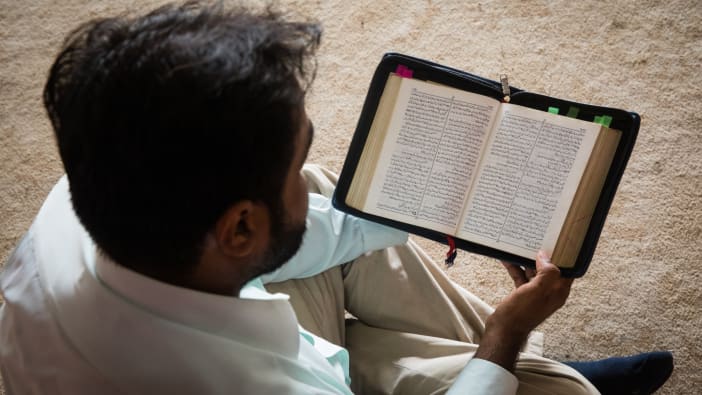Black History Month: a Biblical perspective
Written by Tearfund | 30 Oct 2020



Written by
Written by Tearfund
As we come to the end of Black History Month, we’ve been reflecting on how the Bible and Black history are connected, and what this means for the church today. A vital part of this is an understanding of ‘liberation theology’. Here’s a breakdown of what that is and why it matters.
What is liberation theology?
Theology is the study of God’s character and action in the world. Liberation theology highlights God’s concern for the liberation of people who are marginalised, poor and oppressed.
The clear implication of this is that it must also be a central concern of the church. The church must actively and deliberately play its part in the liberation of oppressed peoples.
Are these ideas Biblical?
Absolutely. Liberation theology is deeply rooted in scripture. From the very beginning, God charges his people with creating a culture of justice for the vulnerable. Here are a few key passages from the Old Testament:
‘This is what the Lord says: Do what is just and right. Rescue from the hand of the oppressor the one who has been robbed. Do no wrong or violence to the foreigner, the fatherless or the widow.’ (Jeremiah 22:3)
‘He upholds the cause of the oppressed and gives food to the hungry. The Lord sets prisoners free, the Lord gives sight to the blind, the Lord lifts up those who are bowed down.’ (Psalm 146:6-8)
‘Is not this the kind of fasting I have chosen: to loose the chains of injustice and untie the cords of the yoke, to set the oppressed free and break every yoke?’ (Isaiah 58:6-7)
In other words, a significant part of our relationship with God is defined by how we treat those who have been let down by society.
‘Jesus is our liberator. Both in his life and teachings and his death on the cross, Jesus walked the path of liberation.’
What does the New Testament say about this?
Jesus is our liberator. Both in his life and teachings and his death on the cross, Jesus walked the path of liberation. And it’s our role as the church to follow in his footsteps.
While the Old Testament passages above focus on liberation at a societal level, in the New Testament we are taught how to apply this on a personal level:
'Then the righteous will answer him, “Lord, when did we see you hungry and feed you, or thirsty and give you something to drink? When did we see you a stranger and invite you in, or needing clothes and clothe you? When did we see you sick or in prison and go to visit you?” The King will reply, “Truly I tell you, whatever you did for one of the least of these brothers and sisters of mine, you did for me.”’ (Matthew 25:35-40)
When we take action to help other people, it is though we are reaching out to Christ himself. This idea is taken further in the book of James:
‘Suppose a brother or a sister is without clothes and daily food. If one of you says to them, “Go in peace; keep warm and well fed,” but does nothing about their physical needs, what good is it? In the same way, faith by itself, if it is not accompanied by action, is dead.’ (James 2:15-27)
The message is clear. Without practical, purposeful action to help people who are suffering – to liberate people who bear the weight of oppression – we are failing as the church.
What does this have to do with Black history?
Black people have been and are being oppressed around the world.
The transatlantic slave trade is an infamous and despicable example of this, but it is far from an isolated case. This oppression can also be subtle: for example, the achievements of Black people have historically not been celebrated as much as those of white people.
The oppression of Black people has its roots in historic colonial abuses, but also in modern systems and structures of power that cultivate injustice. Poverty disproportionately affects Black people globally. The deaths of George Floyd, Breonna Taylor and others over the summer brought into focus the terrible reality of racial injustice today.
If the church is to take up its calling, it must play its part in bringing this to an end.
Why does this matter to Tearfund?
Seeking justice and liberation is central to what we believe and what we do here at Tearfund.
Poverty is a form of oppression. Tearfund exists to empower people to lift themselves out of poverty. Our purpose is to join in with the story of God: which is the story of restoration and liberation.
We all have a role to play in speaking up for and taking action for people who are oppressed. And we won’t stop until we see a world in which everyone is free to fulfil their God-given potential.
How can I pray for these issues?
- Pray for oppressed peoples: pray for chains to be broken, for unjust systems to be changed, and for God’s liberated light and love to break out into the world.
- Pray for the church: praise God for the positive impact that local churches are making in their communities all around the world. Pray that all churches will embrace the call to participate in God’s story of liberation.
- Pray for Black History Month: as the month comes to a close, pray that Black history will be celebrated and honoured not just for this time, but throughout the year, every year.
Share this page
Share this page to spread the word and help support those in need.

Get our email updates
Learn about our work and stay in touch with Tearfund. Hear about our news, activities and appeals by email.
Sign up now - Get our email updates






